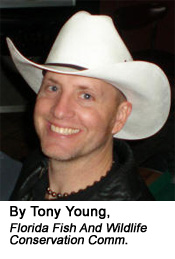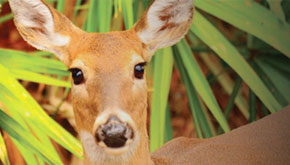FWC: Summer Best Time To Take A Hunter Safety Class
June 29, 2015
With the dog days of summer almost upon us, it’s sometimes hard to even think about hunting. But if you’re age 16 to 40 and haven’t completed the state’s hunter safety course requirement, now’s a good time to be thinking about signing up. Don’t put it off – summer is the best time to take a class in your area.
 Many of these classes, offered statewide, fill up fast during hunting season as people scramble to get certified. So the summer months offer smaller class sizes and a better opportunity for students to take a class, because they have more free time than they will once school cranks up and they get busy with homework and school-related activities.
Many of these classes, offered statewide, fill up fast during hunting season as people scramble to get certified. So the summer months offer smaller class sizes and a better opportunity for students to take a class, because they have more free time than they will once school cranks up and they get busy with homework and school-related activities.
People born after May 31, 1975, must complete the Florida Fish and Wildlife Conservation Commission’s (FWC) hunter safety class before they can buy the type of hunting license that allows them to legally hunt alone. A law passed a few years ago by the Florida Legislature enables individuals to hunt without having to complete the state’s hunter safety certification, but they may only hunt while under supervision.
It’s called the Hunter Safety Deferral, and it allows people the opportunity to purchase a license to hunt while under the supervision of a licensed hunter who is at least 21 years old and meets the hunter safety requirement. It’s designed to encourage experienced hunters to teach novice hunters safety, ethics, wildlife and hunting skills and respect for the great outdoors.
It’s a great incentive for getting more people to try hunting. Also, I hope, the experienced hunters among us can hook some new folks on the sport we love. However, to hunt by yourself unsupervised, you still have to take and pass a hunter safety class and purchase a regular hunting license.
If you’re a youngster and already a hunting fanatic, I suggest you go ahead and take a hunter safety class before you turn 16. Of course, until then, you may hunt under adult supervision without having to take the class or buy a license.
Even if you were born before June 1, 1975, and are exempt from having to take the class, it’s still a good idea, because you’ll learn so much. The FWC encourages beginning hunters to do so. Even the most experienced hunter will learn something new, which will help him or her become an even better hunter – and a safer one.
Also, if you’re new to our state, these classes will make you aware of Florida’s hunting laws. Or, if you just relocated from another town, the classes are a great way to meet other hunters. You can make some new hunting buddies or maybe even get a line on a great hunt club that’s looking for new members.
You can register for a hunter safety class by going to MyFWC.com/HunterSafety or by contacting your nearest FWC regional office. Also, for your convenience, there are two ways to take the course.
Two course options
There’s the traditional course, which is 12 hours of classroom instruction plus a four-hour skills day. If you’d prefer to get most of the classroom stuff out of the way from the convenience of your own home, you can opt for taking the online course. But, you’ll still have to sign up for the skills-day part of the course, which includes time at the shooting range.
The traditional course is offered during four weekdays or on a Saturday-Sunday. If you take it during the week, each session is three hours and offered after normal working hours. On the weekend, you’ll spend eight hours Saturday and four hours Sunday morning in the classroom. For the remainder of the Sunday session, you’ll move to the shooting range to complete your certification.
During the traditional hunter safety class, each segment is roughly 50 minutes long, followed by a 10-minute break. The first thing you’ll learn about is Florida’s hunting laws/regulations. An FWC law enforcement officer gives this introduction. Volunteer hunter safety instructors teach the remaining curriculum.
And speaking of that, if any of you reading this are older than 18 and would like to give something back to the sport of hunting, you might consider becoming a certified volunteer hunter safety instructor in your community. The FWC is always in need of people who possess good hunting and gun safety knowledge. If you’re interested in learning more about this great teaching opportunity, go to MyFWC.com/HunterSafety or call 850-413-0084 to find out how to get involved.
One segment of the program teaches ethics and hunter responsibility. You’ll also learn the parts of a firearm, gun and hunting lingo and the proper way to shoot a firearm. This is the longest section of the program, and you’ll spend approximately two hours going over all that.
You’ll learn the differences between all the various bullets, calibers and gauges and how to identify different animal species. You will also hear about wildlife conservation and discover best management practices for native game species.
In addition, you’ll find out about outdoor survival techniques and learn how to administer first aid in the field. You’ll gain knowledge of the parts of, and how to shoot, a muzzleloading gun. Furthermore, you’ll be taught archery and the fundamentals of how to hunt with a bow.
In your last hour in the classroom, you’ll be given a standardized test of true-or-false and multiple-choice questions. You need to score 80 percent or better, and then you get to move outside to the shooting range for the last part of the hunter safety certification – the skills day portion.
If you choose instead to take your hunter safety class online, you’ll learn all of the material that’s taught in the traditional classroom setting, and you’ll be given a practice test, which will go over what you’ve learned and prepare you for the last segment of the requirement – the skills day.
Skills day
Skills day takes about five hours to complete, which includes time on the shooting range and serves as the completion for both the traditional course and the online class.
Skills days start with a law enforcement officer discussing hunting laws and ethics. After that session, you’ll pass through four different stations. The first station reviews safety rules, then the students demonstrate proper firearms carry positions, safe zones of fire, how to cross obstacles with a firearm and tree-stand safety.
 The second station covers safe, effective shot placement; then students walk down a trail where they are presented with shoot/don’t shoot scenarios. The third station discusses clearing, matching, loading and unloading.
The second station covers safe, effective shot placement; then students walk down a trail where they are presented with shoot/don’t shoot scenarios. The third station discusses clearing, matching, loading and unloading.
After an instructor’s brief presentation, students practice selecting the proper ammunition, loading each of the five major firearms actions, and demonstrating how to properly clear the firearm of ammunition. At the last station, students review marksmanship skills and have different opportunities to practice or demonstrate their skills.
Most students shoot a rifle from various positions, many get to shoot clay pigeons with a shotgun, and others practice archery skills by shooting a bow. Most courses provide a muzzleloader demonstration, where you’ll have the chance to shoot one if you’d like. All guns, bows, targets and ammo are provided. All you have to do is take aim!
The last steps
After you complete the skills day, you’ll be given your hunter safety card. At that point, you can purchase your very first Florida hunting license and be ready for opening day. Youth under 16 – no matter how young – can purchase their first annual license that will be good until their 17th birthday. This allows the FWC to count the youth’s license in their annual license sales until the license expires on their 17th birthday. This benefits a wildlife restoration program by approximately $7 per year for the additional years the child holds a license.
Just a couple of things for parents to remember: The course is designed for youth ages 12 to 16. If your child is younger than 18 years old, you must fill out our parental release form and present it to the instructor at all courses. This will enable your child to participate in the live-shooting exercises. Also, if your child is younger than 16, you are required to accompany him or her to all classes.
Register for a hunter safety class today, ’cause the 2015-2016 huntin’ season is just around the corner.
Submitted by FWC.



Comments